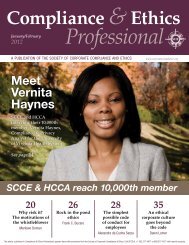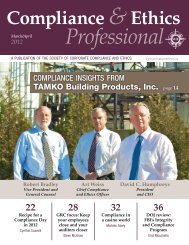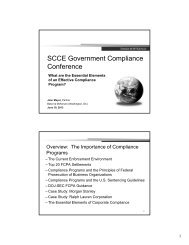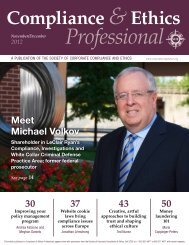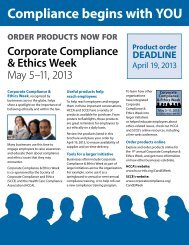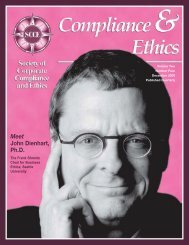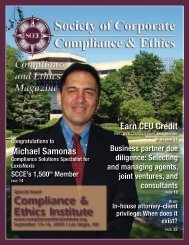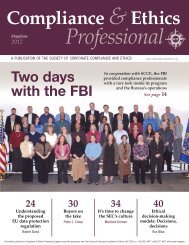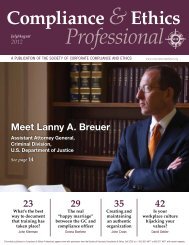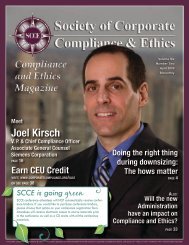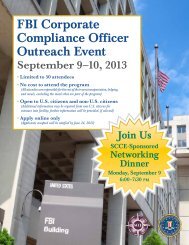JM - Society of Corporate Compliance and Ethics
JM - Society of Corporate Compliance and Ethics
JM - Society of Corporate Compliance and Ethics
- No tags were found...
You also want an ePaper? Increase the reach of your titles
YUMPU automatically turns print PDFs into web optimized ePapers that Google loves.
Meet Jolene Miller... continued from page 25A Long Way…Maybe... continued from page 17employees, both corporate <strong>and</strong>retail. The amendments furtheremphasized the need for ethicstraining for all employees <strong>and</strong>brought the need for such trainingto the forefront <strong>of</strong> senior management<strong>and</strong> our Board <strong>of</strong> Directors,which gave our department a highlevel <strong>of</strong> support for our systemic initiatives.RJ: How do you change organizationalculture to encourage everyoneto act ethically <strong>and</strong> lawfully?<strong>JM</strong>: Change in organizational culturestarts at the top <strong>of</strong> every organization.While every team member isresponsible for acting ethically <strong>and</strong>lawfully, senior management <strong>and</strong> theBoard <strong>of</strong> Directors must hold individualsaccountable for their actions,whether by reward or reprim<strong>and</strong>.RJ: Some people believe that anethics program is only "windowdressing"-areal compliance programemphasizes enforcement <strong>and</strong> discipline,not "doing good." What isyour opinion?<strong>JM</strong>: An ethics program isn't justabout "doing good". It is about providingthe foundation for doing theright thing <strong>and</strong> giving team membersa means to ask questions whenthey are unsure <strong>of</strong> the appropriatecourse <strong>of</strong> action. A strong complianceprogram, including enforcement,discipline, <strong>and</strong> reward, is acritical component <strong>of</strong> an overallethics program. ■enforced consistently throughoutthe organization through appropriateincentives to perform inaccordance with the compliance<strong>and</strong> ethics program…"These requirements are groundbreakingin that they focus on thenecessity <strong>of</strong> an organization toexamine its culture <strong>and</strong> ask thequestion "Do we have a culturewhere doing the right thing is themost rewarding choice to ouremployees?" That's a tough questionto ask, <strong>and</strong> even a harder one toanswer.Now, there is going to be a lot <strong>of</strong>talk in compliance circles about"culture", <strong>and</strong> I imagine that a lot <strong>of</strong>conferences <strong>and</strong> programs will nowfeature that as a topic. In fact, thespeaker following me is going todiscuss that very issue. Again, Iwould remind you <strong>of</strong> one thing-it'sall about the behavior. This time it'sabout management's behavior.Ever hear the saying,"Management's actions are so loudthat the employees can't hear whatthey're saying?" The development<strong>of</strong> a compliance culture requireslooking at not only the elements <strong>of</strong>your compliance program, but athorough, <strong>and</strong> sometimes painful,examination <strong>of</strong> what is really beingreinforced in your organization, <strong>and</strong>then setting about to craft a behavioralsupport system that trulyembraces ethical conduct <strong>and</strong> regulatorycompliance.Business ethics <strong>and</strong> complianceprograms are no longer the noveltythat they were 13 years ago. They'rehere to stay. If we look at 1991 asthe beginning <strong>of</strong> the formalizing <strong>of</strong>this process, then we are looking atan organizational activity that isentering its teen years. A transitiontime from immaturity to maturity.With the new changes in theGuidelines supporting us, those <strong>of</strong>us who are in this pr<strong>of</strong>ession havean opportunity to grow <strong>and</strong> manageour programs in some very meaningfulways.In writing this presentation, I wasreminded <strong>of</strong> the story about theproud parents <strong>of</strong> a five year oldchild who they believed was thenext Chopin. As luck would have it,a famous pianist was coming totheir town <strong>and</strong>, after much persuasionby the parents, agreed to hearthe boy play. The day <strong>of</strong> theappointment arrived <strong>and</strong> the proudparents brought the child to theconcert hall. The master politely listenedto the boy play <strong>and</strong> turned tothe parents <strong>and</strong> quietly said, "Yourchild plays the notes very well, butin order to be great, he will have tolearn to play the music."That is where we are today withmost corporate compliance programs.Most <strong>of</strong> us play the notesvery well. The challenge in thecoming years will be for us to moveonto the next level, to create thatculture <strong>of</strong> compliance within ourorganizations. When we do, we willhave learned to play the music, <strong>and</strong>only then will we have truly come along way. ■February 200522<strong>Society</strong> <strong>of</strong> <strong>Corporate</strong> <strong>Compliance</strong> <strong>and</strong> <strong>Ethics</strong> • (888) 277-4977 • www.corporatecompliance.org




